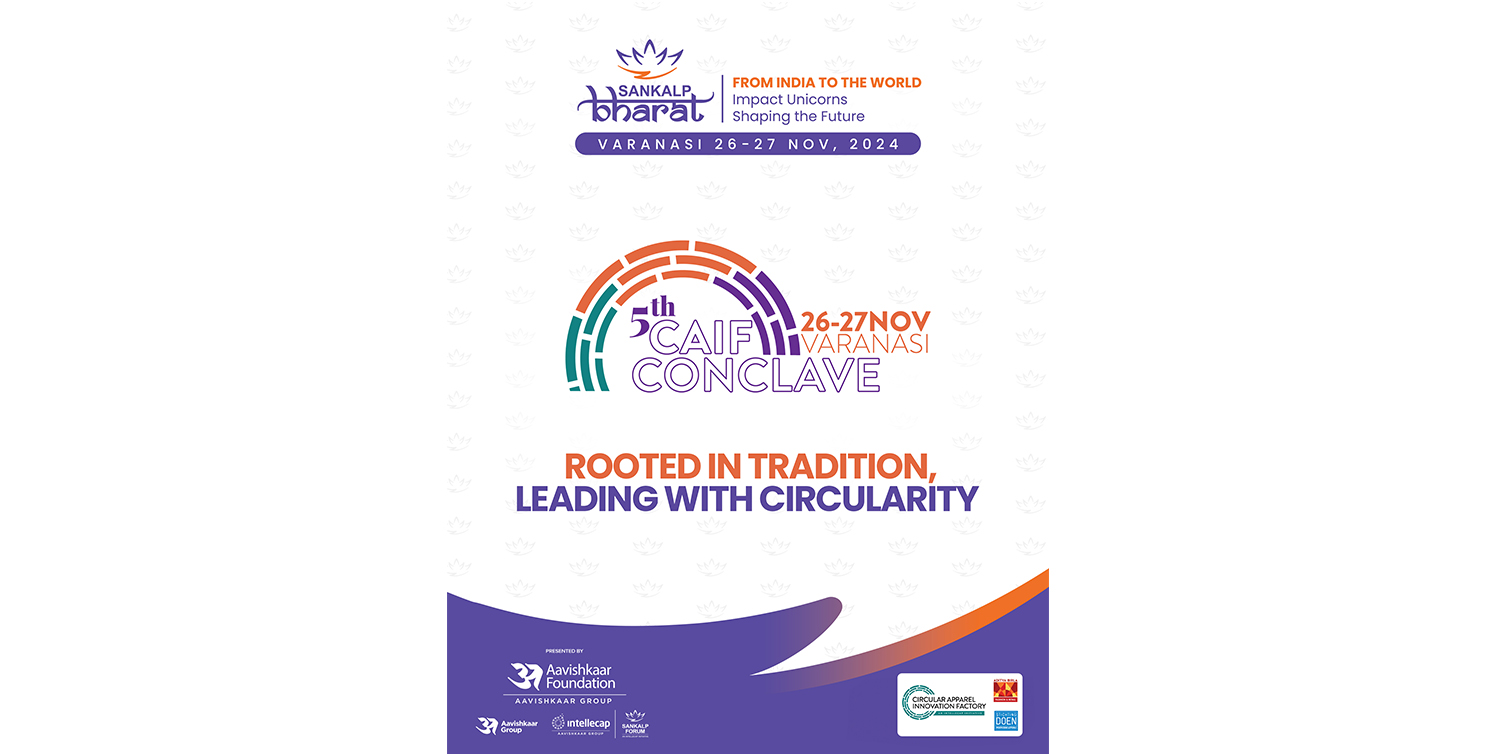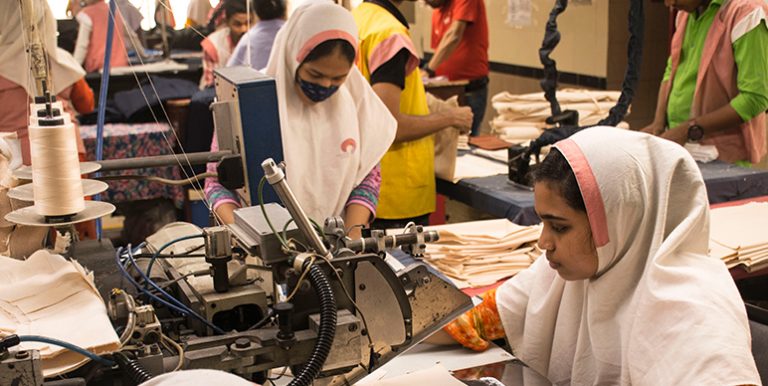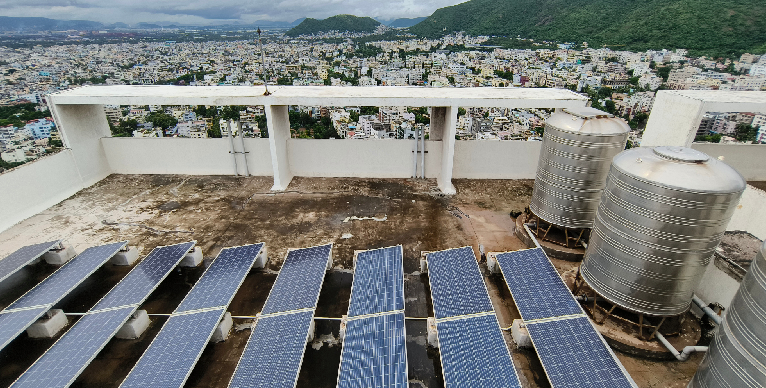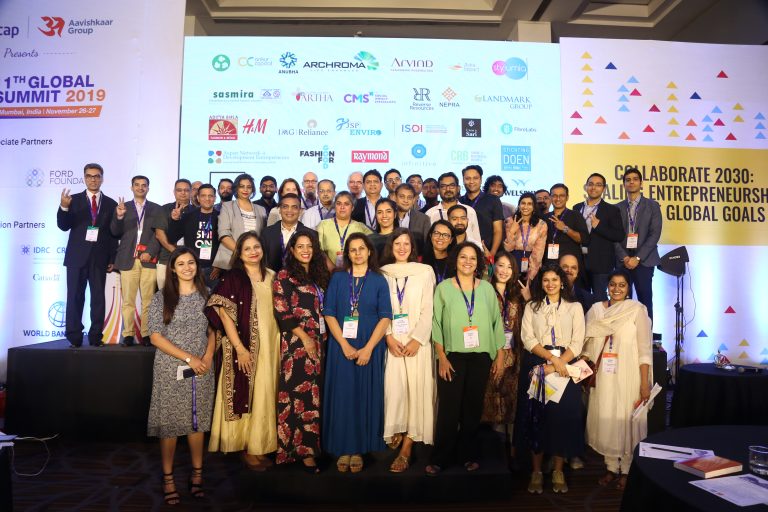CELEBRATING CIRCULARITY AT THE SANKALP BHARAT SUMMIT 2024

Aavishkaar Foundation, part of the Aavishkaar Group was proud to present the Sankalp Bharat Summit 2024, at the Rudraksh International Convention Centre in Sigra, Varanasi on the 26th & 27th of Nov.
Themed around ‘From India to the World: Impact Unicorns Shaping the Future’, this was the 16th edition of the Sankalp convening in India and was the largest celebration of home grown innovators. The Summit laid emphasis on local and regional innovators shaping the future of Indian entrepreneurship and will feature ground breaking enterprises making waves on the global stage.
The Summit positively engaged 700+ delegates including 150+ Global Leaders, 300+ Entrepreneurs, 100+ Investors, Private Sector, Multilaterals, Bilaterals and Govt. Agencies to discuss, define, and drive forward the critical levers of entrepreneurial success.

At the Summit, Circular Apparel Innovation Factory (CAIF) an Intellecap initiative hosted the 5th CAIF Conclave intended to
throw a spotlight on a wide host of pertinent topics. We conducted several sessions on the Textile and Apparel ecosystem and the work of CAIF and its partners. Attending delegates appreciated CAIF’s work in helping build a planet and people positive Textiles and Apparel Fashion Industry.
Be it our extensive work around valorizing textile waste including showcasing our CTWM model, highlighting why we need to make a sustainable shift for a greener supply chain, the aspect of recycle, rewind, reinvent to give fabrics a second life in style, creating circular approaches for the textile and apparel industry and around how to transform the future of flexible plastics, the summit hosted the most pertinent topics, with the intent to meet at the intersection of ideas, insights and innovation.

Circularity on Main Stage:
On Main stage we hosted a Keynote Address from Venkat Kotamaraju, Partner and Director, CAIF, who showcased CAIF’s our work in building the circularity ecosystem and laid emphasis on building sustainable and circular businesses.

This was followed by a main stage panel on the topic, “Sustainable Shift 360: Embracing Circular Strategies for a Greener Supply Chain” which featured V Keshavdev, Deputy Editor, Fortune India in conversation with Dr. RK Singh, CGM, SIDBI; Ankit Todi, Chief Sustainability Officer, Mahindra Group; Ravi Gupta, Executive Director, Renuka Sugars; Neha Mudaliar, Head of Climate & Renewable financing, Northern Arc Capital and Anjalli Kumar, Chief Sustainability Officer, Zomato.
The context to this session was that India’s Textiles & Apparel (T&A) sector aims to boost garment exports to $100B in five years, driven by initiatives like MITRA parks, including a major hub in Lucknow. Employing 40M people, the sector faces growing pressure to adopt sustainable practices, as it contributes 10% of global carbon emissions. This session explored circular solutions like recycling and sustainable sourcing, featuring case studies and strategies to reduce waste, cut costs, and enhance brand loyalty, positioning India as a global leader in responsible textiles.
The Key Takeaways from the session on “Sustainable Shift 360: Embracing Circular Strategies for a Greener Supply Chain” was:
3-step solution to advance circularity: – Problem-solving around core issues: Businesses must address the root causes of waste and inefficiency. – Impact-driven intent: Sustainable solutions must be designed with commercial viability in mind, ensuring scalability – Scaling solutions beyond single organizations: Collaboration across industries is essential for systemic change.
Government Mandates and Incentives: Strong policies are needed to encourage industries to adopt sustainable practices and provide the necessary infrastructure for circularity. Anjalli Ravi Kumar shared Zomato’s ambitious goal for 100% EV-based deliveries by 2030, emphasizing the need for government incentives and infrastructure support to achieve the target.
Consumer Awareness and Consciousness: Educating consumers about sustainability and fostering demand for eco-friendly products is crucial for driving change.
Collaboration and Reverse Logistics: Building partnerships and efficient reverse logistics systems can help scale circularity across supply chains.
Commercial Viability and Scalability: Solutions must not only be sustainable but also economically feasible to encourage widespread adoption.
CAIF Breakout Sessions
We also had several breakout sessions around-

‘Recycle, Rewind, Reinvent: Giving Fabrics a Second Life in Style‘ led by Somatish Bannerji, Partner, CAIF in conversation with the panelists, Nalini Shekar from Hasiru Dala, Dr. Gayathri Vasudevan from Sambhav Foundation, Dr. Naresh Tygai, Chief Sustainability Officer, Aditya Birla Fashion & Retail, Harshit Kakkar from HSN Ecotex (H.R Overseas & Kakkar Spinning Mills) and Shruti Singh from Canopy.
This roundtable explored how to give old clothes a new life by integrating post-consumer textiles into the textile and apparel (T&A) supply chain. Key players—global brands, manufacturers, recyclers, and waste managers— discussed scaling circular materials to reduce reliance on virgin resources. In partnership with Circular Apparel Innovation Factory (CAIF) and Closing The Loop, the roundtable aimed to drive industry-wide adoption of circular fashion solutions.
Key Takeaways from the session, ‘Recycle, Rewind, Reinvent: Giving Fabrics a Second Life in Style’ was:
Five Pathways for Sustainable Textile Waste Management: Closing the Loop focuses on five key pathways to manage textile waste—Thrift, Resale, Upcycle, Recycle, and Downcycle. These approaches aim to reduce waste generation, promote circular economy principles, and encourage sustainable consumer behavior.
Addressing India’s Textile Waste Challenge: With 43% of India’s domestic textile waste being incinerated or landfilled, there is a pressing need for action. The “Closing the Loop” model targets waste reduction at both community and ecosystem levels, supporting 40 waste entrepreneurs in over 20 cities and impacting 10,000 livelihoods.
Corporate Leadership in Sustainability: Aditya Birla Group, a leader in sustainability, introduced initiatives like ‘Re Earth’, adopting sustainable sourcing and production practices to ramp up circularity and enhance the product lifecycle from the design stage to consumer use. Similarly, Hasiru Dala Innovations works on the principle of ‘Inclusive Circularity’, which is the deliberate and planned inclusion of waste pickers and informal waste workers in the evolving circular economy value chain.
Not just Saving but ‘Saving Responsibly’: While youth are major consumers of recycled clothing, they also contribute significantly to fast fashion, highlighting a paradox. The panel emphasized the need for “responsible saving” — urging consumers to make mindful choices in their consumption habits.
And Bridging the Gap Between Supply and Demand: Global brands and suppliers were urged to align production with available supply rather than fluctuating demand. This shift can reduce overproduction and support sustainable practices in the textile industry.

We also hosted a session on, ‘A Vision for Circularity in India’s Textile and Apparel Industry’ in collab with GIZ, Aditya Birla Fashion and Retail Limited (ABFRL) and Centre for Environment Education (CEE). This panel featured Dr. Naresh Tyagi, Chief Sustainability Officer, Aditya Birla Fashion & Retail, Tushar Jani , Senior Program Director from Center for Environment Education (CEE), Kavya Arora, Technical Advisor, Climate Change & Circular Economy, GIZ India, Meghana Kshirsagar, Senior Advisor, Climate Change & Circular Economy, GIZ India, Padmakar Pandey, AVP, Sustainability, Aditya Birla Fashion and Retail Limited, Rahul Mehta, Chief Mentor, Clothing Manufacturers Association of India, Rachna Arora, Director, Climate Change & Circular Economy, GIZ India and Kashyap Arya, Project Coordinator, Centre for Environment Education
This session focused on the need for sustainability and circularity in India’s textile and apparel industry, a significant contributor to the economy. Experts discussed the shift towards a circular economy, highlighting initiatives like Mission LiFE, aimed at promoting resource efficiency and recycling. The session also showcased innovative projects and local impact stories, emphasizing the importance of awareness programs and supporting local artisans.
Key Takeaways from the Session, , ‘A Vision for Circularity in India’s Textile and Apparel Industry’ was-
India’s Textile Sector and Sustainability: India is one of the largest global producers of textiles and apparel, contributing significantly to the economy. However, there is a growing focus on making the sector more sustainable and circular, which involves using resources efficiently and promoting recycling.
Circular Economy adoption- need of the hour: A shift towards a circular economy (CE) in the textile industry is crucial for preserving natural resources. This involves designing durable, reusable products and ensuring that materials can be recovered and recycled at the end of their life.
Key approaches for circular textile and apparel industry: The various approaches adopted for circular textile and apparel industry are Research, mapping good practices; Stakeholder Partnership and networks, Capacity building , Demonstration Pilots, Circularity Manifesto and guidelines compliance, Policy advocacy and Knowledge dissemination.
Government and Industry Initiatives: Various initiatives such as Mission LiFE, Project Su.Re, and the Textile Mission are focused on promoting sustainability, resilience, and circularity within India’s textile sector, aiming to enhance the industry’s global competitiveness.
Challenges to Circularity: Key challenges include a lack of sustainable consumer behavior, cost concerns for recycling and upcycling, and insufficient government support for recycling infrastructure. Overcoming these challenges requires widespread awareness and education programs.
Innovation and Local Impact: Innovation projects like Punarbhavaa and Schutzen chemical products are helping improve sustainability in the textile sector. Additionally, artisans like Maqbool Hasan from Varanasi highlight the importance of supporting local handloom businesses, which face challenges such as a lack of local raw materials.

and “Revalue- Transforming the Future of Flexible Plastics” which featured Devanshu Ralhan, Principal, CAIF with Ankit Gupta, GM-Sustainability from ITC, Alankrita Khera from ACT for Environment, Janvi Papriwal, Associate Partner from Circulate Capital and Aditya Shukla, CEO from Saltech
This session focused on addressing India’s plastic waste challenge, particularly with low-value flexible plastics, which face low recovery rates due to supply-demand imbalances. Key discussions covered creating demand for products made from low-value plastics, scaling solutions for flexible plastics, shifting perceptions on recycled products, brand commitments to recyclable packaging, and understanding the capital needs of innovators. The session sought to discover innovative approaches to drive a circular economy for plastics.
Key Takeaways from the session, Revalue- Transforming the Future of Flexible Plastics’ was :
Innovative Recycling Solutions: Companies like ITC and Saltech are leading the way with innovative recycling technologies, such as turning flexible plastic waste into high-value materials like plastic boards, bricks, and tiles, demonstrating the potential for upcycling.
Investment in Innovation: Investment firms like Circulate Capital are prioritizing funding for ventures that develop cutting-edge recycling technologies, supporting the transition to a circular economy by driving scalable and profitable solutions for flexible plastics.
Policy Support and Incentives: Strong public-private partnerships (PPPs) and policies like Extended Producer Responsibility (EPR) frameworks are crucial for scaling recycling efforts and incentivizing sustainable practices across industries.
Consumer Awareness and Engagement: Educating consumers on proper waste segregation and disposal plays a critical role in improving the efficiency of recycling systems, ensuring that waste is processed correctly and effectively.
Collaboration is Key: A collaborative approach across the value chain—from manufacturers to recyclers—is essential to creating an effective system for managing flexible plastics, ensuring their integration into the circular economy.

CAIF Installation:
At the Summit we at CAIF also showcased an installation that captured three interesting aspects of their ecosystem building work namely, Closing the Materials Loop across the value chain, Enabling a just transition for workers and Accelerated Decarbonization of Supply Chains.

Circular Innovation Award:
A striking feature at the #SankalpBharat2024 was the Circular Innovation Awards 2024 led by Circular Apparel Innovation Factory (CAIF) Intellecap, which rewarded and recognized outstanding enterprises in the Circular space.
The Winner of the Circular Innovation Award 2024 went to Canvaloop led by Shreyans Kokra, CEO, Canvaloop, a startup which has been showcased on Shark Tank and has a proprietary technology that enables them to process the agricultural waste to superior textile fibres thereby bringing significant changes in the textile chain by creating socially inclusive, progressively viable, and adequately available materials and to promote sustainability in the textile industry. Team Canvaloop received the recognition from Venkat Kotamaraju, Partner & Director, CAIF-Intellecap with Anjalli Ravi Kumar, Chief Sustainability Officer, Zomato
Each of these CAIF sessions was designed to stimulate circular entrepreneurs and empower circular innovators to redefine growth and create positive impact.
With over 35 Sessions and 60+ exhibition showcases, across the two days, the Sankalp Bharat Summit was an unparalleled gathering of visionaries, industry experts, and decision-makers, to exchange high-value insights, explore forward-thinking strategies, and foster partnerships that will shape the future of entrepreneurship. At the summit, transformative ideas met actionable solutions, and ambitions turned into measurable outcomes, shaping the future of businesses and the economy.








